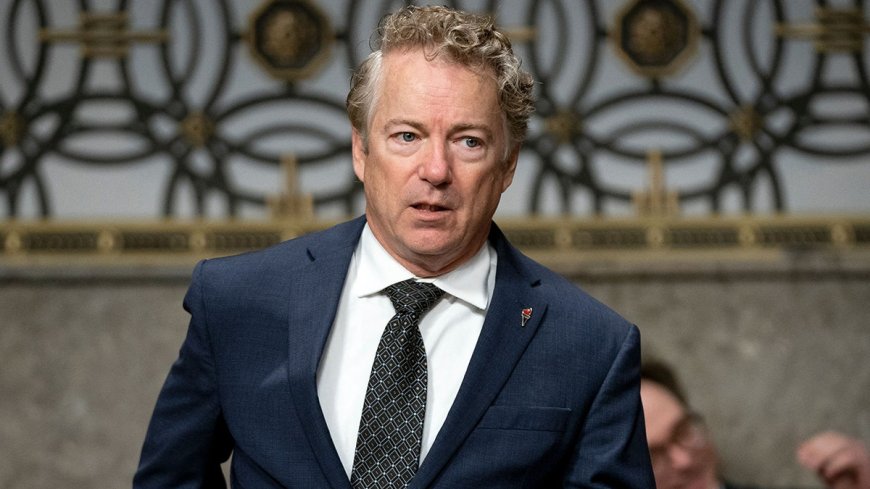SEN RAND PAUL: The GOP once knew how to fix the deficit — now they’re losing the battle

The nation’s federal deficit slightly improved in June when the federal government actually ran a surplus. But, in July, the federal government’s deficit grew by nearly 20%, despite the increased collection of taxes on imports (which are known as tariffs). Nevertheless, the protectionists are loudly crowing about tariffs as the answer to our deficit woes.
Time will tell whether tariffs make a dent in annual deficits, but there was a time when conservatives united against the idea of raising taxes to balance the budget. I remember my father’s misgivings toward a balanced budget amendment to the Constitution because he feared encouraging the concept of balancing the enormous federal government expenditures with new taxes.
Think of it this way: currently the U.S. government spends $7 trillion annually and brings in approximately $5 trillion dollars. Historically and viscerally, conservatives once opposed closing the gap by raising taxes.
FETTERMAN JOINS FISCAL HAWKS TO SOUND ALARM AS NATIONAL DEBT NEARS STAGGERING $37T
In 1982, while speaking to the AFL-CIO, President Ronald Reagan stated, "We don’t have a trillion-dollar debt because you aren’t taxed enough. We have a trillion-dollar debt because we spend too much." A generation later, after the Tea Party wave swept Republicans into a majority in the House of Representatives, Speaker John Boehner acknowledged "Washington does not have a revenue problem. Washington has a spending problem."
Republican concern regarding the debt connects generations of elected officials. Today’s highest-ranking congressional leaders have expressed the view that the source of our debt is spending even the United States cannot afford. A few years before he became Speaker of the House, Mike Johnson (R-LA) said, "A continued pattern of reckless federal spending is not only irresponsible, it’s dangerous. We have a moral obligation to restore fiscal sanity to the Congress so that our children and grandchildren have the opportunity to enjoy the same blessings of liberty that we have."
In 2023, the current Senate Majority Leader, John Thune, wrote in an op-ed, "Taxing the rich may be a convenient political slogan, but it will not bring in enough money to dig us out of the hole we are in. We have to find a responsible way to rein in federal spending."
Even the current secretary of the Treasury acknowledges that profligate spending is weakening America. At his confirmation hearing before the Senate Finance Committee, Scott Bessent said "one of the things that got me out from behind my desk and my quiet life... was the thought that this spending is out of control... And I am concerned because, several times, the Treasury of the United States was called upon... to save the world and… we would be hard-pressed to do the same."
For decades, Republicans of every conceivable stripe have united in the belief that the nation’s debt problem, which threatens to doom America to economic decline, cannot be solved with higher taxes.
However, today, most Republicans have lost their moorings and readily cheer reducing the debt with tariffs.
CLICK HERE FOR MORE FOX NEWS OPINION
The unfinished narrative on tariffs will play out over the next six months to a year. Republicans once argued that if you tax something you’ll get less of it. As the year unfolds, the question remains: If you tax trade, will you get less trade? If you tax imported goods, will the cost of the tax ultimately be borne by the consumer?
Some proponents of tariffs loudly proclaim that tariffs will fund the entire federal government as they did in the 19th century. That would be true if we would choose a government today that only spends about 3 percent of GDP (as the federal government did for much of the 19th century). Government spending over the last five years averaged over 26% of GDP and could never be funded by tariffs alone.
In the meantime, Republicans should take with a grain of salt increased revenue and ask themselves whether the goal is to balance a bloated budget with increased taxes or instead limit the size and scope of government. This important question once differentiated conservatives from liberals — I hope the current fad for import taxes doesn’t entice all conservatives to forget the goal of a small, constitutional federal government.
What's Your Reaction?
 Like
0
Like
0
 Dislike
0
Dislike
0
 Love
0
Love
0
 Funny
0
Funny
0
 Angry
0
Angry
0
 Sad
0
Sad
0
 Wow
0
Wow
0











